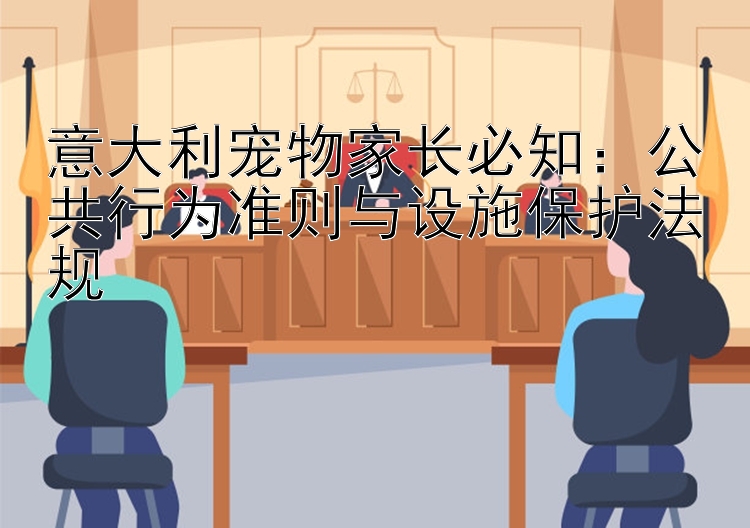意大利宠物家长必知:公共行为准则与设施保护法规
在意大利,宠物被视为家庭的一部分,它们给人们带来了无尽的快乐和陪伴。然而,作为负责任的宠物主人,了解并遵守当地的法律法规是至关重要的。本文将探讨意大利的宠物饲养者应该知道的公共行为准则和设施保护法规,以及相关的案例分析。
一、公共行为准则 1. 遛狗时必须使用牵引绳:根据意大利法律规定,除非在指定的无牵引区,否则在任何公共场所都必须为狗狗佩戴牵引绳。这一规定有助于防止意外事故的发生,同时保护其他人的安全和权利。 2. 清理宠物的排泄物:所有宠物的主人都有责任及时清理他们的宠物在公共场所留下的粪便。这不仅是礼貌的行为,也是法律的要求。大多数公园和其他公共场所都设有垃圾桶或专门的粪便收集袋分发点。 3. 禁止虐待动物:意大利对动物福利有严格的法律保护。任何形式的虐待动物都是非法的,包括忽视宠物的基本需求,如食物、水和适当的住所。违反这些规定可能会导致严重的法律后果,包括罚款甚至监禁。 4. 噪音污染控制:夜间(通常定义为晚上10点至早上7点之间)或者在不适当的时间制造过大的噪音是违法的。因此,宠物主人需要注意宠物的叫声,尤其是在夜晚,以避免打扰邻居的生活。 5. 尊重他人的空间和隐私:宠物主人在带宠物外出时要确保它们不会干扰他人,例如追逐行人或其他动物,或者进入私人领地。
二、设施保护法规 1. 保护历史和文化遗址:许多意大利城市都有丰富的文化遗产,因此在某些区域可能会有特别的限制,比如不允许携带宠物进入特定的古迹或博物馆。 2. 维护公共场所清洁:除了上面提到的清理宠物粪便外,宠物主人还应该注意不要让宠物破坏公共区域的植被或者其他设施。 3. 在特定区域内活动:在一些海滩、公园和其他户外场所,可能存在允许宠物活动的特定区域,同时也可能有禁止宠物进入的区域。
三、相关案例分析 1. ** In Italy, pets are considered part of the family and they bring a lot of joy and companionship to their owners. However, as responsible pet parents, it is crucial to be aware of and comply with local laws and regulations regarding pet ownership. This article will explore the public behavior codes and facility protection laws that Italian pet guardians should know about, along with relevant case studies for better understanding.
I. Public Behavior Codes: 1. Dogs must be on leashes when being walked: According to Italian law, dogs must wear a leash in any public space unless specifically designated as off-leash areas. This regulation helps prevent accidents and protects the safety and rights of others. 2. Pet waste disposal: All pet owners have the responsibility to clean up after their pets in public places. It's not only polite but also legally required. Most parks and other public spaces provide trash cans or distribution points for poop bags. 3. Prohibition against animal abuse: Italy has strict legal protections for animal welfare. Any form of cruelty towards animals is illegal, including neglecting their basic needs such as food, water, and proper shelter. Violating these rules can lead to severe legal consequences, including fines and even imprisonment. 4. Control of noise pollution: Making excessive noise outside of appropriate times (usually defined as between 10 p.m. and 7 a.m.) is illegal. Therefore, pet owners need to pay attention to their pets' barking, especially at night, to avoid disturbing neighbors. 5. Respect for personal space and privacy: When taking pets out, owners should ensure that their pets do not disturb others by chasing people or entering private property without permission.
II. Facility Protection Regulations: 1. Protection of historical and cultural sites: Many cities in Italy have significant heritage, so there might be special restrictions in certain areas where pets may not be allowed, like specific monuments or museums. 2. Maintenance of public area cleanliness: In addition to cleaning up after your pet's waste, pet owners should also make sure that their pets do not damage public greenery or facilities. 3. Designated activity zones within facilities: Some beaches, parks, and outdoor locations may have specific areas set aside for pets, while other regions could prohibit them entirely.
III. Relevant Case Studies: Case Study 1: The Case of Fido in Florence Fido was an energetic dog owned by Mr. Rossi who loved walking him around the city center of Florence. One evening during his walk, Fido got excited and started barking loudly near some residential buildings. A neighbor called the authorities due to the disturbance caused by the barking. As a result, Mr. Rossi faced legal consequences, including being fined for causing unnecessary noise pollution during non-designated hours. He had to take measures to control Fido's barking, such as using a muzzle or training techniques, to avoid further issues.